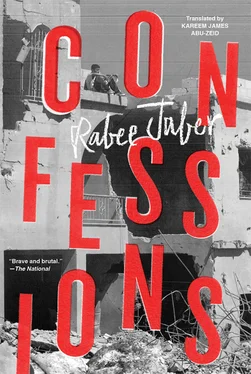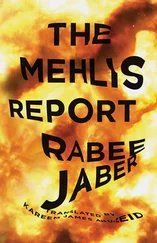Are you wondering what all this has to do with the story I was telling? I’m trying to make a point about memory. Memories are misleading. When I remember things from long ago, am I remembering what actually happened? And you, do you think your memories are real? You remember things from long ago, but they’re not here anymore, right? For example, you remember a room in your family’s house, a room where you often used to stretch out on the sofa and look out the open window at a patch of sky, or at the balcony of the building across the way, or at a tree — to what extent is that memory real? Maybe the house isn’t there anymore, maybe the whole street’s changed. Isn’t that right? Buildings change, trees die, and all that…. Isn’t that right? Memories are misleading. The trees were there before, but where are they now? I think about these things a lot. And I wonder: Can one go back to those places?
One day, my mother saw me playing soccer in front of the house and started to cry. Then she said I wasn’t allowed to play soccer anymore. I didn’t understand it. Ilya took me aside and said he used to love soccer too, but he’d stopped since mother didn’t want him to play. And he asked me to do the same, for her sake. I wanted to know why but he wouldn’t tell me. Later on, Julia said something vague about my little brother. I didn’t understand exactly what she was saying — whenever anyone talked about my dead brother, things became vague: they’d trail off mid-sentence and never finish what they were saying. All my sisters were like that. Even Najwa avoided talking about him. But I put the story together from their few scattered hints: Like me, my dead brother used to love soccer, and he used to leave the house a lot to go play. And one of those times they kidnapped him.
I stopped playing soccer in front of the house — I wouldn’t play anywhere in the neighborhood, not even in the park. For a while we used to play soccer in the abandoned train station by the park. But Mary saw me once — or rather, she said she saw me from a distance and recognized my blond hair and my shirt. She said she recognized my hair, but I wasn’t convinced. Mary was like that: she’d say the craziest things and then laugh at me when I believed them. But that time I didn’t believe her. I found out how she knew I’d been playing: my socks — the red sand had stained my socks. I went to great lengths to keep it from them. I wouldn’t come home till I’d washed my face and hands — and even my hair — at a sink in the station. And whenever Julia saw me enter the house with messed-up clothes and a red face, I’d say we’d been running, or that we’d been playing hide-and-seek, but that we hadn’t been on the field. You’re not a child anymore, she’d reply, so why are you playing hide-and-seek? Are you lying to me? Do you want to upset your mother? Do you… She’d raise her voice just a bit, just loud enough for me to worry that mother would hear us from her room. I’d swear to her that I hadn’t been playing soccer. I’d swear by Jesus Christ the Savior and by our Mother Mary — and I felt no fear.
Although I swore like that, I wasn’t afraid of going to hell — what was hell? I wasn’t afraid of Satan’s fires, and why should I burn? — because I played soccer with my friends? I wasn’t afraid of those small lies (I lied for my mother’s sake, so she wouldn’t worry), but I was afraid of other things. And when the stories I heard started to multiply, I became even more afraid.
They’d tell stories in school. There was a playground where none of us ever played because it was exposed to sniper fire (a row of buildings shielded the school on the other side, the side closest to West Beirut). There were some kids playing in that playground one day — it wasn’t big enough for soccer, it was quite small, and there was an old olive tree in one corner where the concrete gave way to dirt — yes, the kids were playing there (this happened before I was at that school) and one of them fell to the ground. What were they playing? They were playing tag: one of the boys would run after the others to tag them, and when he got you — it was important that he didn’t tear your shirt — then you’d be “it,” and it was your turn to chase the others. Or maybe they were jumping rope. Does it matter what they were playing? The playground was full of children eating sandwiches that they brought from home, drinking soda, scrambling around, and laughing and telling stories and jokes (it was the 10 a.m. recess). There was a terrible noise, then a burst of laughter, and in the middle of all that a boy fell to the ground. No one had pushed him, but he fell.
They’d tell stories at school, and they’d point out the black spot on the concrete, in the fenced-off playground that we weren’t allowed to enter (there was a gate with a lock and chains). If a ball flew over the tall wire fence and landed over there — in the forbidden playground — it was gone forever. No one dared climb the fence to get the ball: we were afraid of sniper fire, and even more afraid of being punished. We were afraid that the principal or one of the administrators would see us.
As I remember this now, I can picture deflated balls on the concrete, behind the fence. I’m not sure if this is a real memory — am I imagining things? And I can see a ball that wasn’t deflated, a ball that was still round because it hadn’t been hit by sniper fire. But no one climbed the fence to get the ball. We knew the sniper was waiting. We knew he’d left the ball as a trap.
The most horrific things we heard were stories of kidnappings. Shelling was easier than kidnapping. Shelling was clear and simple: the bombs would fall, and they wounded or killed people. We used to collect the cold shrapnel off the street (Mitri, the son of George Tayyan, put them in glass jars and sold them to a man who had a store in the Tabaris district). We weren’t scared when we gathered up shrapnel. Shelling was something we knew: this is a 106 shell, we used to say, and this is a 105. But kidnapping: What did they do to the ones they kidnapped? I knew things no one else knew — I, the boy who used to get dressed each morning in the living room beneath the picture of my dead brother on the wall, I knew things. I used to sleep in the living room with Liliane and Najwa. We’d spread out on the sofas and go to sleep. Other times, depending on how things were, the whole family would sleep in the living room.
I knew things, but not completely. What happened, for example, to the ones who were kidnapped but whose corpses were never found? Where were they? Who was holding them? And where exactly were they holding them? What were they doing with them? All of that was black, dark — the stuff of my nightmares.
I was a growing boy, and whenever I outgrew any of my clothes, Julia or Mary brought me some more from the closet: I’d never seen those clothes before. There were many closets. (There was a closet in my mother’s room, a closet in the family room, which we called the “winter room,” and one in the sitting room, though we rarely ever sat in it because it was open and exposed to the shelling. There was also a closet by the stairs that led to the roof, and another one in Julia’s room, which wasn’t really a closet, but a bunch of boxes that Ilya had painted white and stacked on top of one another — Mary had sewn a curtain for it, and stitched green grape leaves in the corner of the curtain.) Clothes and socks had been stuffed into the depths of the closets, along with lavender and dried leaves from other fragrant plants, which kept the moths away. I remember how someone’s hand would slowly take the clothes out and give them a good shake. Once I saw Julia smell one of the shirts, and an expression of immeasurable sorrow passed across her face.
Читать дальше












